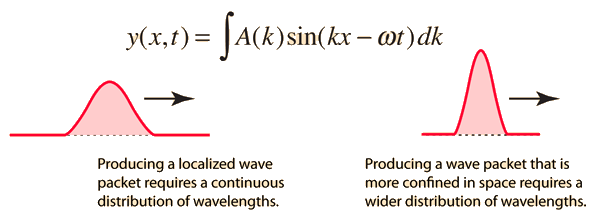I think it's important to point out that if a problem admits bound states, then there is always a boundary condition at infinity, which comes from demanding that the wave function go to zero as $x \to \pm \infty$.
It's interesting to note that for a particle in a box, the quantisation condition that leads to discrete solutions comes from demanding that the wave function vanish at (say) $x=0$ and $x=L$. Similarly, in problems like the harmonic oscillator or the hydrogen atom, the quantisation conditions arise by imposing the condition that the wave functions vanish at $\pm \infty$. (This is worked out in Griffiths' text.)
Now, the case that you mention in your question is essentially that of a free particle (a particle in a box with the walls infinitely far away), and as mentioned in the answer by Thatpotatoisaspy, you can construct a wave packet to define the particle as being ''localised'' somewhere, and thus you can speak of a particle as having some probability of being found somewhere in space.

